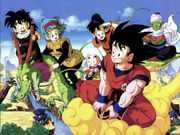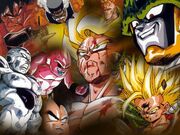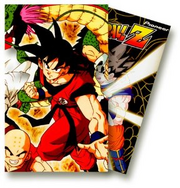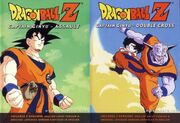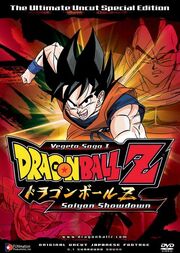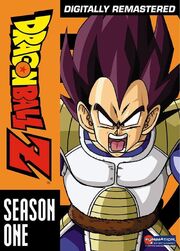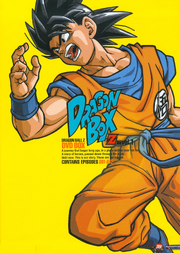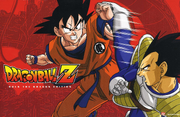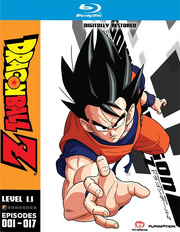Dragon Ball Z (original) (raw)
This article is about the anime adaptation of the original manga's second part. For other uses, see Dragon Ball (disambiguation).
| Dragon Ball Z | |
|---|---|
 |
|
| Dragon Ball ZドラゴンボールZゼットDoragon Bōru Zetto | |
| Genre | Action, Adventure, Comedy, Fantasy, Science Fiction, Martial Arts |
| Anime series: Dragon Ball Z | |
| Directed by | Daisuke Nishio (#1-199)Shigeyasu Yamauchi (#200-291) |
| Studio | Toei Animation |
| Written by | Takao Koyama |
| Licensor |  Madman Entertainment Madman Entertainment Funimation Funimation Funimation UK Funimation UK |
| Network |  Fuji Television Fuji Television Network Ten, Cartoon Network Network Ten, Cartoon Network YTV YTV Cartoon Network Cartoon Network Cartoon Network, CNX, Toonami Cartoon Network, CNX, Toonami First-run syndication, International Channel, Cartoon Network (Toonami) First-run syndication, International Channel, Cartoon Network (Toonami) |
| Original run | April 26, 1989 — January 31, 1996 |
| No. of episodes | 291 |
| Manga chapters adapted | 195-519 |
| Streaming Sites | Prime Video Crunchyroll |
Dragon Ball Z (ドラゴンボールZゼット, _Doragon Bōru Zetto, commonly abbreviated as DBZ) is the long-running sequel to the anime Dragon Ball. The series is a close adaptation of the second (and far longer) portion of the Dragon Ball manga written and drawn by Akira Toriyama. In the United States, the manga's second portion is also titled Dragon Ball Z to prevent confusion for younger readers.
Overview
Story
Dragon Ball Z opening title card in the original Japanese version
Dragon Ball Z follows the adventures of the adult Goku who, along with his companions, defends the earth against an assortment of villains ranging from intergalactic space fighters and conquerors, unnaturally powerful androids and near indestructible magical creatures. While the original Dragon Ball anime followed Goku through childhood into adulthood, Dragon Ball Z is a continuation of his adult life, but at the same time parallels the maturation of his son, Gohan. Also spanning the series is the development of the rivalry between Goku and Vegeta, from deadly enemies to reluctant allies. The separation between Dragon Ball and Dragon Ball Z is also significant as the latter series takes on a more dramatic and serious tone. The anime also features characters, situations and back-stories not present in the original manga.
Production history
Most of the main characters of Dragon Ball Z
The other names the production was considering for this second series before they settled on Dragon Ball Z were Dragon Ball: Gohan's Big Adventure, New Dragon Ball, Dragon Ball 2, Dragon Ball Wonder Boy, and Dragon Ball 90.[1] The anime first premiered in Japan on April 26, 1989 (on Fuji TV) at 7:30 p.m. and ended on January 31, 1996. The series average rating was 20.5%, with its maximum being 27.5% (Episode 218) and its minimum being 12.1% (Episode 273). Like Dragon Ball, the music for Dragon Ball Z was composed by Shunsuke Kikuchi. The character designs for Dragon Ball Z were created by Minoru Maeda from the Raditz Saga to the Cell Games Saga and Katsuyoshi Nakatsuru from the Great Saiyaman Saga to the Peaceful World Saga.
Toriyama's humor/parody manga Nekomajin, released after Dragon Ball and Dragon Ball Z, features several concepts introduced in the series, and several Dragon Ball Z characters make various appearances in this manga. After Dragon Ball Z, the story of Goku and friends continues in the anime-only series Dragon Ball GT, which is not based on a manga by Akira Toriyama but is a project by Toei Animation using the same characters and storyline that serves as a sequel to Dragon Ball Z. 19 years after the end of Dragon Ball Z in Japan, a new sequel series titled Dragon Ball Super premiered with original concepts by Akira Toriyama, taking place after the death of Kid Buu but before Dragon Ball Z's ending.
In the USA, the series initially aired in first-run syndication from September 13, 1996, to May 23, 1998, and then aired on Cartoon Network's Toonami block from August 31, 1998, to April 7, 2003, though not always with the same continuity of dubbing (for details on the dubbing problems, see Ocean Group dubs and Funimation dub).
It was also shown in Canada on YTV around the same time. It aired in the UK, with the same dubbing problem, on Cartoon Network, premiering on March 6, 2000, and running on that channel until 2002. The Majin Buu Saga, Fusion Saga and Kid Buu Saga were later broadcast on CNX, which later changed its name to Toonami, with the show ending on February 28, 2003. After the finished run, it was repeated daily, until Toonami merged with Cartoon Network. In Australia it was shown on both Cartoon Network and Network 10 with Cartoon Network airing it in around 1997-1999 and Channel 10 from 1999-2004. In New Zealand, it was shown on TV3.
In April 2009, a new "refresh" of Dragon Ball Z began airing on Japanese television. This re-cut is titled Dragon Ball Z Kai.
Censorship issues
Dragon Ball Z was marketed to appeal to a wide range of viewers from all ages and contains crude humor and occasional excesses of violence which are commonly seen as inappropriate for younger audiences by American standards. When it was first marketed in the US, the distribution company Funimation alongside Saban decided to initially focus exclusively on the young children's market, because the anime market was still small compared to the much larger children's cartoon market. This censorship often had unintentionally humorous results, such as changing all references to death, so the dead characters were merely going to "another dimension", and digitally altering two ogres' shirts to read "HFIL" instead of "HELL".
Starting with the Captain Ginyu Saga on Cartoon Network, censorship was reduced due to fewer restrictions on cable programming. Funimation did the dubbing on their own this time around with their voice actors. In 2004, Funimation began to redub the first two sagas of Dragon Ball Z, to remove the problems that were caused by their previous partnership with Saban. They also redubbed the first three movies.
However, the show still retained some level of censorship, not out of FCC laws, but out of choice by Funimation, to cater to the possible sensitivity of western audiences. For example, Mr. Satan was renamed "Hercule" to avoid any religious slurs; his daughter, Videl, was a play on the word "Devil", but Funimation felt that the connection was obscure enough to not worry about.
Filler and differences from the manga
Filler is used to pad out the series for many reasons; in the case of Dragon Ball Z, more often than not, it was because the anime was running alongside the manga, and there was no way for the anime to run ahead of the manga (since Toriyama was still writing it, at the same time).
Some of the series' main heroes and villains
The company behind the anime, Toei Animation, would occasionally make up their own side stories to either further explain things, or simply to extend the series. Filler does not come only in the form of side stories, though; sometimes it is as simple as adding some extra attacks into a fight. One of the more infamous examples of filler is the Frieza Saga. After Frieza had set the planet Namek to blow up in five minutes, the final fight between Goku and Frieza still lasted well over five episodes, much less five minutes, although this can be attributed to the fact that Namek simply took longer to explode than Frieza expected. Also, many numerous filler scenes took place while the battle with Frieza was in motion, which accounts for much of the footage during the planet's explosion.
As the anime series was forced to expand 12 pages of manga text into 25 minutes of animation footage, these changes were introduced to kill time or to allow the (anime) writers to explore some other aspect of the series' universe. The Garlic Jr. Saga (Garlic Jr.'s return from the Dragon Ball Z: Dead Zone movie) between the Frieza Saga and Trunks Saga and the Other World Tournament between the Cell Games Saga and the Majin Buu Saga are both good examples of this.
Besides having filler scenes and episodes, there are many other changes from the original manga. Among them are the following:
- When Tien Shinhan loses his arm while fighting Nappa, his arm becomes a stump with only a small amount of blood seen. In the manga, the scene is much gorier.
- In the manga, Frieza kills Cargo, but in the anime Dodoria kills him.
- In the manga, Zarbon informs Vegeta about Frieza's ability to transform during their first fight. This was removed from the anime, but Vegeta still later tells Frieza that it was Zarbon who told him about Frieza's transformation ability.
- In the manga, Appule finds all the Namekians in the village attacked by Vegeta dead and tells Frieza, who just tells him to call the Ginyu Force. In the anime, the soldier is changed to another soldier referred to as "Orlen" in the closed captioning for the Ocean Dub VHS tapes. This soldier is killed by Frieza when he tells that he killed the last survivor of the village without asking him where Vegeta had hidden the Four Star Namekian Dragon Ball.
- In the manga, after Frieza survives Goku's Spirit Bomb, he immediately strikes down Piccolo with his Death Beam technique. In the anime, however, Frieza fires his beam at Goku, only for Piccolo to jump in the way and get struck down by the beam anyway.
- In the manga, Frieza's full power was still never a match for Goku's Super Saiyan form, but in the anime, Frieza appears to have the upper hand for a short time before he begins to tire.
- In the anime, when Vegeta is brought back to life on Planet Namek, he manages to witness some of the battle between Goku and Frieza, as well as Goku's Super Saiyan form, before being teleported to Earth by the Namekian Dragon Balls. In the manga, he is teleported to Earth almost immediately after being revived and does not get a chance to see Goku as a Super Saiyan for the first time until Goku returns to Earth himself later on.
- When Dr. Gero first appears in the series (as Android 20), he grabs a man by the neck and tears him through the roof of a car. In the original manga, he crushes the man's neck afterward, tearing his head off.
- In the manga, when Goku fully recovers from the Heart Virus, Chi-Chi finds him simply looking out the window of the bedroom he was resting in at Kame House. In the anime, however, Chi-Chi finds him outside the house, firing several Kamehameha blasts across the ocean.
- During Gohan and Cell's Energy Clash in the anime, Piccolo, Krillin, Tien, and Yamcha unsuccessfully try to distract Cell before Vegeta succeeds in doing so, whereas in the manga, they all simply observe the struggle and Vegeta is the only one to attack Cell from behind.
- When Vegeta shoots a Galick Blazer at Cell, he is seen in his Super Saiyan form in the anime. In the manga, he is seen in his base form. Similarly, Goku's spirit is seen in his Super Saiyan form in the anime as he and Gohan perform the Father-Son Kamehameha against Cell, while he is seen in his base form in the manga.
- Though the flashback of Future Trunks and Future Gohan fighting Androids 17 and 18 are present in both the anime and the manga, there are notable discrepancies between the flashback and the scene depicted in the TV special Dragon Ball Z: The History of Trunks. In the special, Gohan had not lost his arm yet at the beginning of the story, Trunks had not yet achieved his Super Saiyan form too, and there was rain in the scene in question.
- When Vegito fights Super Buu (with Gohan absorbed) in the manga, Vegito immediately transforms into his Super Saiyan form. In the anime, Vegito fought in his base form for a while before becoming a Super Saiyan. Similarly, in the anime Goku and Vegeta battle Super Buu together (unsuccessfully) before fusing into Vegito, while in the manga Goku is able to convince Vegeta to fuse with him before Buu gets a chance to attack them.
- When Goku begins his battle against Kid Buu in the manga, he transforms immediately into his Super Saiyan 3 form. In the anime, however, Goku starts the battle as a Super Saiyan 2 and manages to hold his own against Kid Buu for a while before ascending to Super Saiyan 3.
- In the manga, many characters have a different number of fingers on their hands, such as Piccolo (3 fingers and a thumb), Dodoria (3 thumb-like fingers), and Imperfect form Cell (two long fingers and a long thumb). In the anime, everybody has human-like hands with 4 fingers and a thumb.
Reception and Impact
The impact of Dragon Ball Z is enormous. For more than 20 years, the series has stood the test of time and has reached out to many children and adults alike across the globe. This is mainly due to the series' very clear representations of good overpowering evil, love overpowering hate, the importance of family and friends, and an unyielding passion toward achieving goals. The series also featured heavy sci-fi overtones, and a greater emphasis on fighting - making it extremely popular among adolescent boys who had grown up alongside the original series.
Dragon Ball Z - along with Sailor Moon and Pokémon - has also played a large part in contributing to the popularity of anime in western culture. Though the first two seasons of the series were played on various networks in the U.S. in 1996, it would not take off for two more years until August 31, 1998, when Cartoon Network featured the show in its action oriented Toonami lineup. Toonami heralded the show as "The Greatest Action Cartoon Ever Made," and it greatly boosted the popularity of Toonami, but unknowingly did so much more. Dragon Ball Z's newfound popularity helped to bring about a greater interest in Japanese cartoons in the eyes of western youth, which in turn fueled the western anime industry to new heights. Because of its success on Toonami, Dragon Ball Z was the first anime that made its way to the Wall Street Journal, who declared it "A Huge Cartoon Hit."
Many items such as apparel, backpacks, lunch boxes, writing utensils, candies, drinks, foods and more feature Dragon Ball Z, in both Japan and North America. Action figures, collectible figurines, plush toys, bobbleheads, and character model kits were also made. The fast-food chain Burger King featured Dragon Ball Z toys twice in the early 2000s. Despite the TV series officially ending in Japan in 1996, and in 2003 in North America, Dragon Ball Z video games are created nearly every year for almost every console on the market, helping to introduce the Dragon Ball Z series to younger generations that never got a chance to see it air on television. These games usually do very well in the market. Popular sites such as YouTube have attracted large Dragon Ball Z fan communities throughout the last few years, and Dragon Ball related videos receive many views. All of these examples showcase the incredible popularity of Dragon Ball Z in many countries of the world.
The original author of the manga, Akira Toriyama, held a great deal of respect for both the Dragon Ball and Dragon Ball Z anime and those that developed them. Toriyama also admired the fact that the anime managed to possess original stories created by the animation team and stated that he considered the Dragon Ball anime to be equal in importance to the Dragon Ball manga.[2]
Sagas
Toei sagas
- Attack of the Saiyans (Episodes 1–35) (April 26, 1989—February 7, 1990)
- Battle on Planet Namek (Episodes 36–74) (February 14, 1990—January 16, 1991)
- Terrible Emperor Freeza (Episodes 75–107) (January 23, 1991—September 11, 1991)
- Fight with Garlic Jr. (Episodes 108–125) (September 18, 1991—January 29, 1992)
- Android No. 16~20 (Episodes 126–147) (February 5, 1992—July 8, 1992)
- Over the Super Saiyan (Episodes 148–165) (July 15, 1992—November 18, 1992)
- Beginning of the Cell Games (Episodes 166–194) (November 25, 1992—July 21, 1993)
- Ano-yo'ichi Budōkai (Episodes 195–219) (July 28, 1993—March 2, 1994)
- Majin Boo Returns (Episodes 220–237) (March 9, 1994—August 24, 1994)
- Appearance of the Super Saiyan III (Episodes 237–254) (August 31, 1994—February 1, 1995)
- The Final Fighter, Vegetto (Episodes 255–268) (February 8, 1995—June 28, 1995)
- The Final Battle (Episodes 269–291) (July 5, 1995—January 31, 1996)
Funimation sagas
- Raditz Saga (Episodes 1–6 [1–4 edited]; formerly part of the "Saiyan Saga")
- Vegeta Saga (Episodes 7–35 [5–26 edited]; formerly part of the "Saiyan Saga")
- Namek Saga (Episodes 36–67 [27–53 edited])
- Captain Ginyu Saga (Episodes 68–74 [54–60 edited])
- Frieza Saga (Episodes 75–107 [61–92 edited])
- Garlic Jr. Saga (Episodes 108–117 [93–102 edited])
- Trunks Saga (Episodes 118–125 [103–110 edited])
- Androids Saga (Episodes 126–139 [111–124 edited])
- Imperfect Cell Saga (Episodes 140–152 [125–137 edited])
- Perfect Cell Saga (Episodes 153–165 [138–150 edited])
- Cell Games Saga (Episodes 166–194 [151–179 edited])
- Other World Saga (Episodes 195-199 [180-184 edited])
- Great Saiyaman Saga (Episodes 200–209 [185–194 edited])
- World Tournament Saga (Episodes 210–219 [195–204 edited])
- Babidi Saga (Episodes 220–231 [205–216 edited])
- Majin Buu Saga (Episodes 232–253 [217–238 edited])
- Fusion Saga (Episodes 254–275 [239–260 edited])
- Kid Buu Saga (Episodes 276–287 [261–272 edited])
- Peaceful World Saga (Episodes 288–291 [273–276 edited])
Movies, TV specials, OVA
Movies
Toei titles
- Return My Gohan!! (1989) (Originally released without a subtitle)
- The World's Strongest Guy (1990)
- Super Deciding Battle for the Entire Planet Earth (1990)
- Super Saiyan Son Goku (1991)
- The Incredible Mightiest vs. Mightiest (1991)
- Clash!! 10,000,000,000 Powerful Warriors (1992)
- Extreme Battle!! The Three Great Super Saiyans (1992)
- Burn Up!! A Close, Intense, Super-Fierce Battle (1993)
- The Galaxy at the Brink!! The Super Incredible Guy (1993)
- The Dangerous Duo! Super-Warriors Can't Rest (1994)
- Super-Warrior Defeat!! I'm the One who'll Win (1994)
- Fusion Reborn!! Goku and Vegeta (1995)
- Dragon Fist Explosion! If Goku Can't Do It, Who Will? (1995)
- God and God (2013)
- Revival of "F" (2015)
Funimation titles
- Dragon Ball Z: Dead Zone (1997) (Re-released with a new dub on May 31, 2005; Remastered/Re-released on May 27, 2008)
- Dragon Ball Z: The World's Strongest (1998) (Re-released with a new dub on November 14, 2006; Remastered/Re-released on May 27, 2008)
- Dragon Ball Z: The Tree of Might (1998) (Re-released with a new dub on November 14, 2006; Remastered/Re-released on September 16, 2008)
- Dragon Ball Z: Lord Slug (2001) (Remastered/Re-released on September 16, 2008)
- Dragon Ball Z: Cooler's Revenge (2002) (Remastered/Re-released on November 11, 2008)
- Dragon Ball Z: The Return of Cooler (2002) (Remastered/Re-released on November 11, 2008)
- Dragon Ball Z: Super Android 13! (2003) (Remastered/Re-released on February 18, 2009)
- Dragon Ball Z: Broly - The Legendary Super Saiyan (2003) (Remastered/Re-released on March 31, 2009)
- Dragon Ball Z: Bojack Unbound (2004) (Remastered/Re-released on February 18, 2009)
- Dragon Ball Z: Broly - Second Coming (2005) (Remastered/Re-released on March 31, 2009)
- Dragon Ball Z: Bio-Broly (2005) (Remastered/Re-released on March 31, 2009)
- Dragon Ball Z: Fusion Reborn (2006) (Remastered/Re-released on May 19, 2009)
- Dragon Ball Z: Wrath of the Dragon (2006) (Remastered/Re-released on May 19, 2009)
- Dragon Ball Z: Battle of Gods (2014)
- Dragon Ball Z: Resurrection ‘F’ (2015)
TV specials
Toei titles
- A Lonesome, Final Battle: The Father of Z-Warrior Kakarrot, who Challenged Freeza (1990)
- Summer Vacation Special (1992)
- Resistance to Despair!! The Remaining Super-Warriors, Gohan and Trunks (1993)
- Looking Back at it All: The Dragon Ball Z Year-End Show! (1993)
Funimation titles
- Dragon Ball Z: Bardock - The Father of Goku (2000) (Remastered/Re-released in February 19, 2008)
- Dragon Ball Z: The History of Trunks (2000) (Remastered/Re-released in February 19, 2008)
OVA
- Dragon Ball: Plan to Eradicate the Saiyans (1993)
- The World of Dragon Ball Z (2000)
- Dragon Ball: The Return of Son Goku and Friends! (2008)
- Dragon Ball: Plan to Eradicate the Saiyans (2010)
- Dragon Ball: Episode of Bardock (2011)
Releases
Japanese releases
Originally, only the Dragon Ball Z movies and the Plan to Eradicate the Saiyans OVA were available for home viewing in Japan. The movies were released on both VHS and Laserdisc format. The Plan to Eradicate the Saiyans OVA was released both on VHS and the PlayDia, as an interactive FMV.
Dragon Box releases
In 2003, all of the Dragon Ball Z TV series was finally released under the "Dragon Box" label for home viewing in Japan, on two large DVD boxed sets, following the release of a similar set for Dragon Ball. Each Dragon Ball Z Dragon Box had a large number of DVD extras, as well as an action figure and a book.
The video and audio transfers of the show used on these DVDs came off of the Fuji TV master tapes of the show, as this allowed Toei to put out a far superior and completely accurate version of the show on DVD, which was helpful since the entire plot of a season could be summed up in about ten minutes. This allowed all episodes to have their original openings, endings, eyecatches, next episode previews, etc., compared to what was available in the US.
In late 2005 the Dragon Box Z DVDs were re-released in single volumes with six episodes per disc. While the packaging and DVD menus are different from the 2003 release, and so far, no plans have been announced for the two TV specials and the Playdia footage released with the 2003 versions, the Audio and Visual quality is the same as those discs found in the 2003 Dragon Box release.
On April 14, 2006, a "Dragon Box: The Movies" DVD box was released. This release contained all 17 Dragon Ball and Dragon Ball Z theatrical features, containing 8 DVDs in total, along with a book, and two scouters in the form of walkie-talkies. The video and audio are remastered; however, the video is cropped to 16:9 (widescreen) and contains less picture than the full-screen versions. This is a common occurrence for films from Toei based on long running and popular TV series (See Saint Seiya, Fist of the North Star, and One Piece).
All Dragon Box releases contain Japanese language audio only (with exceptions to foreign-language bonus clips), and no subtitles.
Pioneer DVDs
DVD Boxed Set I; The Saiyan Conflict
During the late 90's/the early '00s, the first 53 (Saban/Funimation version numbers, originally uncut as 67) TV episodes were released on to DVD by Pioneer Entertainment (now NBCUniversal Entertainment Japan). These contained only the edited, US-TV broadcast versions (dubbed by the Ocean Group), and totaled 17 volumes, comprising the 'Saiyan Saga' and the 'Namek Saga'.
Along with these episodes, Pioneer also produced bilingual, uncut DVDs of the first three Dragon Ball Z theatrical features. These DVDs retained the original Ocean cast for the English track, as well as being one of the first uncut and bilingual releases in the U.S. The English versions of these films were also subject to a different treatment than the series; rather than replacing the original music, the original OP and ED themes, as well as background music, were retained. The only noticeable differences besides languages are the inclusion of a few different sound effects which are not present on the original Japanese version. These films were released as a three-disc boxset by Pioneer.
As of August 31, 2004, Pioneer's license for video distribution of the first 53 episodes ended, allowing Funimation to re-release them. At the moment, the rights for these episodes and the first three Dragon Ball Z movies belong to Funimation.
Funimation DVDs
Funimation's Captain Ginyu Saga DVDs
As of 2000, Funimation had released uncut versions of their Texas-based English dub on to DVD, with Japanese language track, and English-translation subtitles. This release does not include the first two sagas, as the rights for the distribution of that episodes were still held by Pioneer Entertainment. These DVDs begin with the Captain Ginyu Saga and contain every episode covering (Japanese numbers) 68 till 291. Boxsets were release for the Garlic Jr., Androids, Imperfect Cell, Perfect Cell, World Tournament, Majin Buu, Fusion, and Kid Buu U.S. sagas. However, to maximize profits, the DVDs were released out of continuity (certain amounts of one section of the series were released, and then Funimation would go back and release others). With no noticeable numbering visible, this caused frustration to those trying to follow the series from start to finish.
Funimation also released Dragon Ball Z movies 4-13, finishing the release of the movies with Wrath of the Dragon, the 13th movie. These are all bilingual and subtitled, but do not follow the trend set by Ocean's first three movies. Music has been changed and altered, including the insertion of songs from rock bands such as Deftones, Disturbed, Breaking Point, and American Pearl. The movies utilize Funimation's TV series Texas cast, though they also include the original Japanese version with subtitling by Steve Simmons.
Funimation Ultimate Uncut DVDs
Vegeta Saga I: Saiyan Showdown
After acquiring the video rights to the first 53 (67 uncut) episodes from Pioneer in 2004, Funimation announced that they would release these episodes uncut, with a new 5.1 English language track and uncut footage. The "Ultimate Uncut Special Edition" line was born. The release would be 22 volumes, bilingual, and extras. The Saiyan Saga was renamed the 'Vegeta' Saga (Parts I and II, covering 12 DVDs), probably to avoid confusion with the Pioneer volumes. However, after DVD volume 9, Funimation canceled these box sets and planned to re-re-release them in the DVD season boxsets. This upset fans who had purchased the expensive Ultimate Uncut DVDs, as the Vegeta Saga Part II was never completed and the Ultimate Uncut Namek Saga DVDs were not created.
Funimation had also acquired the rights for the first three movies from Pioneer in 2004 and re-released them. Even though the three had the same cover style, only the first movie was released under the Ultimate Uncut line. All of these movies had a 5.1 English track, new subtitles, different DVD extras and come in a boxset titled 'First Strike'. However, they do not retain the original dub and contain a new English dub produced by Funimation's Texas cast. This version contains different music than the original dub and the Japanese version.
Funimation Remastered Box Sets
Season 1
In November 2005, Funimation announced they would release a remastered form of Dragon Ball Z on DVD beginning in 2007. All Dragon Ball Z episodes were to be digitally remastered and released in boxset form.
The first season set (the entire Vegeta Saga) was re-released on February 6, 2007. The first 39 episodes of this season are spread across 6 discs and cost 30–30–30–50 (the original intention was for 5 discs, but there was a risk of quality reduction). Funimation released a trailer for the new set on the Dragon Ball Z official website.
Funimation released the second season set, containing both the Namek and Captain Ginyu sagas, on May 22, 2007. Beginning with this release, several of the in-house voice actors re-dubbed their characters' lines to keep consistency with the remainder of the dub. The third season set, containing the Frieza Saga, was released on September 18, 2007. The fourth season, containing both the Garlic Jr., Trunks and Android sagas, was released on February 11, 2008. Season five, containing both the Imperfect and Perfect Cell sagas, was released on May 27, 2008. Season six, containing the Cell Games Saga, was released on September 16, 2008. Season seven, containing both the Great Saiyaman and World Tournament sagas, was released on November 11, 2008. Season eight, containing both the Babidi and Majin Buu sagas, was released on February 10, 2009. Season nine, containing both the Fusion and Kid Buu sagas, was released on May 19, 2009.
The series has been re-transferred at 1080p resolution with digital restoration technology removing all grain and scratches from Funimation's original prints of the series. It is important to note, however, that like many late 80's-early 90's Toei productions (for example, Saint Seiya, Sailor Moon, Marmalade Boy, Ghost Sweeper Mikami, and Slam Dunk), the series was produced on 16-millimeter film which tends to be fairly grainy and soft. The new restoration was supervised by colorist Steve Franko.
The series is presented in a widescreen format (1.78:1, cropped from the original full frame) for the first time. Comparison images from the new set show that while there is missing footage on the top and bottom, there is at least additional footage on the right and left that has not appeared in any prior release, having been taken straight from the original Japanese film master recording.
This format change was highly controversial among fans, as this is not how the T.V. episodes were intended to be seen and this substantially alters them. Many fans launched a letter-writing campaign against the release. In response to the negative fan outcry regarding the release's apparent cropping of the source video, a Funimation representative has released a document from the team remastering the video, which explains the logistics of the new release. This document details how certain areas of the original film are damaged, and admits that though the video is cropped, this release eliminates the grain that was present on prior 4:3 releases. It has also been theorized that it is ultimately more inexpensive to transfer the series in 16:9 and thereby remove the damaged portions of the frame than to repair 291 episodes' worth of damaged film.
The boxset contains a revised English track in Dolby Digital 5.1 surround sound (it contains the original Japanese score by Shunsuke Kikuchi, although it is unknown just how the English dialogue is revised). For the first time, there is a choice between having the Japanese dialogue with Toei's original Japanese music or English dialogue with either Funimation's dub music or Toei's original Japanese music.
Special features include a featurette on the remastering of the original Japanese print and a 24-page booklet with episode summaries, character descriptions and a Dragon Ball Z timeline.
Funimation Dragon Box Sets
Dragon Box 1
Funimation Dragon Box sets were confirmed for release by Funimation Entertainment on July 19, 2009. The Dragon Box was produced from the original Dragon Box masters after a frame-by-frame restoration and spans the entire 291 episodes of Dragon Ball Z.
This definitive DVD box release begins with Dragon Box One which includes the first 42 episodes, uncut, on 6 discs.
The Dragon Box releases feature an aspect ratio of 4:3, the original Japanese audio (with options for an English track or English subtitles), the original episode previews, complete opening and closing credits and a collector's booklet.
While Toei's Dragon Ball Z Dragon Boxes consists of only two volumes, Funimation's divides the series into seven; Dragon Box One was released on November 10, 2009, with an SRP of $79.98, while Dragon Box Two was released on February 16, 2010, Dragon Box Three was released on May 4, 2010, Dragon Box Four was released on September 21, 2010, Dragon Box Five was released on April 26, 2011, Dragon Box Six was released on July 5, 2011, and Dragon Box Seven was released on October 11, 2011.
Funimation Rock the Dragon Edition Box Set
It is the release of the original Funimation/Saban dub of Dragon Ball Z in a box set. The set consists of the 53 episodes (which were edited from the first 67 Japanese episodes of Dragon Ball Z) and includes the first three Dragon Ball Z movies (Dead Zone, The World's Strongest, The Tree of Might). It was released on August 20, 2013. The collector's edition features the Ocean voice cast and opening theme song "Rock the Dragon". It also features a hardbound full-color 48-page book that showcases the character's history, and tropes that helped elevate Dragon Ball Z to the pop culture it is today.
Funimation Blu-ray Level Sets
In July 2011, Funimation announced plans to release Dragon Ball Z in Blu-ray format. The first volume was released on November 18, 2011. However, after the release of the second volume, Funimation discontinued production of the rest of the Blu-ray releases, citing concerns over restoring the original film material frame by frame. The episodes were presented in their original 4:3 aspect ratio.
Funimation Season Blu-ray Sets
Funimation confirmed in June 2013 that the Blu-ray season box sets of Dragon Ball Z would take place once again. The first set, "Dragon Ball Z Season 1", was released on December 31, 2013, and the final set, "Dragon Ball Z Season 9", was released on December 9, 2014. The episodes are presented in the cropped 16:9 widescreen format. However, unlike the "Orange Brick" DVD sets which were a "straight crop", these use pan and scan so that important information in the frame is not lost.
Funimation 30th Anniversary Collector's Edition
On March 2, 2019, Funimation announced that Dragon Ball Z will be celebrating its 30th Anniversary with a Collector's Edition Blu-ray box set, which compiles the full series in a 4:3 aspect ratio along with some extra goods. However according to Funimation, they need at least 2,500 fans to reserve the set for it to be produced and need to measure the interest since it's a high-cost endeavor, and 2,500 is the minimum of interested fans needed. But if Funimation fails to get the 2,500 pledges to produce the Collector's Edition, they will not release the anniversary set. However, Funimation announced that they needed 3,000 pre-orders from fans and the previous 2,500 pledges was a mistake. Funimation began taking pre-orders for the set on April 6 and had since then reached the necessary 3,000 pre-orders needed, making them eligible to produce 6,000 units of the set overall. The release of the teaser for this box set sparked many controversies among fans who viewed the teaser featuring the remastered clips. The main concern was the remastered footage's framework, color saturation and other footage components that looked worse than previous footage from older collector's edition. Funimation responded by stating that they cropped the release by going in "scene-by-scene to make judgments based onto the image available in each frame of how much to trim to get to a consistent 4:3 aspect ratio, while still attempting to cut as little out of the picture as possible," and that they felt the digital video noise reduction was "mandatory for this release based on the different levels of fan support from various past DBZ releases with different levels of noise reduction over the years." Funimation took pre-orders for the 30th Anniversary Collector's Edition until May 5. It was released on November 5th, 2019.
Manga
An "anime comic" manga adaption of the Dragon Ball Z anime was released in Japan from 2005 to 2010. The sagas covered included the "Saiyan Saga", "Super Saiyan / Ginyu Special-Squad Saga", "Super Saiyan / Freeza Saga", "Artificial Humans Saga", "Cell Game Saga", "Afterlife Tournament Saga", "Majin Boo Revival Saga", and "Majin Boo Battle Saga".
Main cast list
Staff
- Series Director: Daisuke Nishio, Shigeyasu Yamauchi
- Episode Director: Atsutoshi Umezawa, Daisuke Nishio (23 episodes), Hidehiko Kadota, Hidehiko Kadota, Hiroki Shibata, Johei Matsuura, Jun'ichi Fujise, Kazuhisa Takenouchi, Kazuhito Kikuchi, Masahiro Hosoda, Minoru Okazaki, Mitsuo Hashimoto, Osamu Kasai, Shigeyasu Yamauchi (31 episodes), Takahiro Imamura, Tatsuya Orime, Yoshihiro Ueda
- Assistant Episode Director: Akihiko Yamaguchi, Hidehiko Kadota, Jun'ichi Fujise, Keiko Hashimoto, Tatsuya Orime, Toshihiro Ishikawa, Yasuhiro Kamimura
- Producer: Kenji Shimizu (Fuji TV), Kōzō Morishita
- Assistant producer: Hiromi Seki (Toei Animation), Seiichi Hiruta (Toei Animation)
- Production manager: Matsuji Kishimoto (1-58), Takeshi Torimoto (59-109), Akihiko Yamaguchi (110-169), Yuichi Suenaga (170-291)
- Public Relations: Yumiko Shigeoka (Fuji TV)
- Series Composition: Takao Koyama
- Screenplay: Atsushi Maekawa, Aya Matsui Hiroshi Toda, Katsuyuki Sumisawa, Keiji Terui, Masashi Kubota, Reiko Yoshida, Satoru Akahori, Sumio Uetake, Takao Koyama, Toshiki Inoue, Yoshiyuki Suga
- Storyboard: Daisuke Nishio (26 episodes), Johei Matsuura, Katsumi Aoshima, Kazuhisa Takenouchi, Minoru Okazaki, Mitsuo Hashimoto, Osamu Kasai, Shigeyasu Yamauchi (32 episodes), Yoshihiro Ueda
- Production Advancement: Akihiko Yamaguchi, Kazumi Fujioka, Kazumitsu Matsusaka, Kouichi Hirose, Mitsuo Hashimoto, Yoshiaki Yanagi, Yuichi Suenaga
- Character Design: Katsuyoshi Nakatsuru (eps 200-291), Yūji Ikeda
- Chief Designer: Ken Tokushige (eps 200-291), Yūji Ikeda
- Art: Chigusa Yokoyama, Hitoshi Nagasaki, Kayoko Koitabashi, Kenji Matsumoto, Masazumi Matsumiya, Shigenori Takada, Shinobu Takahashi, Takeo Yamamoto, Tsutomu Fujita, Yoshito Watanabe, Yūji Ikeda
- Background Art: Chigusa Yokoyama, Eiko Ito, Goichi Katanosaka, Hideaki Kudo, Hiroaki Kaneko, Hiromitsu Shiozaki, Hisaharu Iijima (ep 42), Hitoshi Nagasaki, Izumi Wada, Junichi Taniguchi, Kayoko Koitabashi, Kazuhiko Suzuki, Kazumi Chiba, Keito Watanabe, Kenji Matsumoto, Kyōko Matsunaga, Masanori Tachibanada, Masao Kajitani, Masuo Nakayama, Mio Isshiki, Momonori Taniguchi, Mutsumi Matsui, Nanae Fukui, Natsuyo Kato, Noriyoshi Doi, Reiichirō Yanagisawa, Rumiko Minemura, Sanae Makino, Sawako Takagi, Shinichi Kamiyama, Shinobu Takahashi, Shoji Tokiwa, Tadahiko Ono, Tadashi Iwasa, Takeo Yamamoto, Tatsuro Iseri, Tetsuhiro Shimizu, Toki Sakamaki, Tomoko Shitamoto, Tomoko Takahashi, Tomoko Yoshida, Toshiko Odagiri, Yoko Ichihara, Yuji Kihara, Yukio Suzuki, Yuko Iida, Yuko Saitou, Yumiko Ogata, Yutaka Itō
- Animation Director: Ichio Hayashi (ep 245), Ichirō Hattori, Katsumi Aoshima, Katsuyoshi Nakatsuru (OP 2; eps 44, 120), Kazuya Hisada, Keisuke Masunaga (18 episodes), Masahiro Shimanuki, Masaki Sato (ep 64), Masayuki Uchiyama, Minoru Maeda, Mitsuo Shindō, Naoaki Hōjō, Naoki Miyahara, Tadayoshi Yamamuro, Sachio Ebisawa, Shingo Ishikawa, Takeo Ide, Tomekichi Takeuchi, Yukio Ebisawa, Yuuji Hakamada
- Chief animator: Katsuyoshi Nakatsuru, Minoru Maeda
- Key Animation: Akio Katada, Akira Inagami, Chikako Uesugi, Eisaku Inoue, Hideko Okimoto, Hiroshi Takeuchi, Hisashi Eguchi, Katsuhiro Nakatsuru, Katsuki Aoshima, Katsuyoshi Nakatsuru (21 episodes), Kazuo Takigawa, Kazuya Hisada, Kenji Yokoyama, Kiyoshi Matsumoto, Kuniko Iwagami, Mamoru Hosoda (ep 173), Masahiro Shimanuki, Masaki Sato (17 episodes), Masako Sankaku, Masayuki Uchiyama, Miki Ugai, Minako Ito, Naoki Mishiba, Naoki Miyahara, Naoki Tate, Naotoshi Shida, Tadayoshi Yamamuro, Noriko Ichihashi, Noriko Shibata, Tai'ichirō Ohara, Takahiro Yoshimatsu, Takeo Ide, Teruhisa Ryu, Tetsuya Numako, Tetsuya Saeki, Tomekichi Takeuchi, Tomoya Iida, Toshiyuki Kan'no, Yoko Arai, Yoko Iizuka, Yosuji Kudo, Yukio Ebisawa
- In-Between Animation: Akemi Seki, Akihiko Nomura, Akiko Matsumoto, Akira Kato, Ayumi Kondou, Chikako Uesugi, Chiori Matsuda, Chizuko Kawamura, Daisuke Hiruma, Eriko Kimura, Hideaki Maniwa, Hidehiko Kadota, Hideki Inoue, Hiroaki Shimizu, Hiroaki Yoshikawa, Hiromi Ono, Hiromi Shirakami, Hiroyuki Kanbe, Hitoshi Ehara, Hisashi Nakayama, Iwao Ōtsuka, Izumi Ichiki, Izumi Komatsu, Junji Kiyohara, Junko Miyamoto, Junko Shirasu, Kanae Suwa, Kayo Nangumo, Kayo Tanahashi, Kazue Ōneda, Kazufumi Takano, Kazuhiro Takahashi, Kazuyoshi Minato, Keiko Sasa, Kenichi Koyabe, Kimiko Hoshi, Kiyomi Ishiwata, Kiyomi Masuda, Kiyomi Masuko, Kōichirō Tanigishi, Kōji Usui, Kouji Aoki, Kumiko Horikoshi, Kuniko Iwagami, Kunitoshi Ishii, Kyoko Higurashi, Maki Itō, Masahiro Hamamori, Masahiro Takano, Masatoshi Hakada, Masayuki Yoshihara, Mayumi Fukushi, Mayumi Nakamura, Megumi Yamashita, Midori Iwai, Miho Fujimoto, Minako Ito, Mineto Shibawaki, Miwa Oshima, Miyako Nishiwaki, Miyuki Abe, Miyuki Nakamura, Miyuki Shibazaki, Miyuki Yano, Naoaki Hōjō, Naoki Mishiba, Naoki Tate, Noriko Ichihashi, Rumiko Ōmiya, Sai Yamane, Sanae Kojima, Shigeru Komatsuzaki, Shigeru Nishioka, Shigetaka Nagata, Shiho Takeuchi, Shiho Tamai, Shinichi Kaneko, Shinji Higashida, Shiori Nozawa, Takahiro Umehara, Takashi Aoyama, Takayuki Komori, Takayuki Ushiki, Takeshi Mochida, Tomoko Hirokawa, Tomoko Tanifuji, Tomomi Shimazaki, Toshiko Nakamura, Toshiyuki Komaru, Toshiyuki Sugano, Wataru Abe, Yasushi Morimoto, Yoko Arai, Yoko Tanida, Yoshie Komatsu, Yoshifumi Miyaji, Yosuji Kudo, Yū Ōkusa, Yuko Inoue, Yūko Kogawara
- Special Effects: Chiaki Hirao, Kazuya Sakurada, Kunji Tanifuji, Masayuki Kawachi, Masayuki Nakajima, Nobuhiro Shimokawa, Shōji Satō, Yoshiaki Okada, Yūji Okajima, Yukari Hashimoto
- Ink & Paint: Fumie Itō, Hideko Sakai, Hiromi Saitō, Ikuno Shimada, Ikuyo Uemura, Kaoru Sugawara, Maki Kamioka, Mariko Higuchi, Mayumi Shiba, Michiko Masui, Miho Sudō, Misae Suzuki, Sachiko Itsukida, Satoshi Nakahata, Takayo Matsui, Tokie Ōkawara
- Photography: Hiroshi Itō, Katsunori Maehara, Sadafumi Sano, Takeshi Ando, Takeshi Fukuda, Tetsuo Ôfuji, Yukio Sugiyama
- Music: Shunsuke Kikuchi
- Music Selection: Shigeru Miyashita
- Sound Director: Nobuhiro Komatsu
- Sound Effects: Hidenori Arai
- Recording: Kenji Ninomiya
- Editing: Shinichi Fukumitsu
Theme Songs
Japanese Themes
Openings:
Version 1: episodes 1~21 (not on FUNimation's DVDs, except for the remastered version of Dead Zone and the Season 1 Blu-ray)
Version 2: episodes 22~117
Version 3: episodes 118~199
Endings:
English Themes
- Openings:
- "Main Title" (AKA "Rock the Dragon")
- "Dragon Ball Z" (AKA "DBZ Theme")
- "Dragon Ball Z" (Ocean dub episodes 108-276)
- "Dragon Ball Z Uncut Theme"
- "Dragon Ball Z Movie Theme"
- "DBZ Movie Theme"
- "Eternal Sacrifice" (Broly - The Legendary Super Saiyan theme song)
- Endings: most English endings are simply shortened or otherwise altered versions of the openings, however the "Ultimate Uncut Special Edition" release used "Summon Up the Dragon".
Reception
Dragon Ball Z peaked at 25% ratings, and its lowest point was 13.5%, much better ratings than its successor, Dragon Ball GT (which got up to 14%). However, in America, Dragon Ball GT DVDs outsold Dragon Ball Z ones in 2003.[3]
See also
References
- ↑ Supplemental Daizenshuu, 1996
- ↑ "The Anime and Me", Dragonball Z Anime Special, 1989
- ↑ Anime Insider December 2003 (#10), "The QT on GT"
External links
- Official Toei Animation's website
- Official FUNimation's website
- Official Manga UK's website
- Official Madman's website

